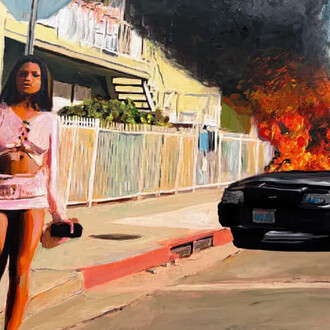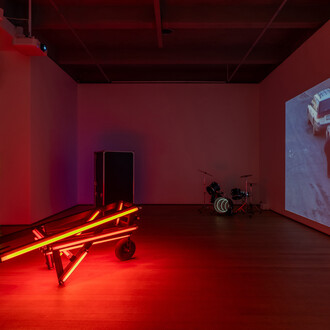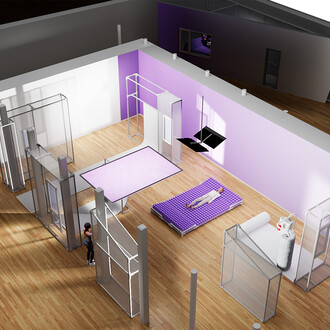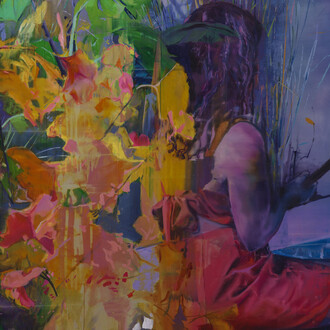The material starting point of Bryce Kroll’s works proves an unlikely ground to mine for novel forms: Obsolete and deconstructed machinery. The spectral casts of recognizable parts from a more or less distant past serve as reminders of the banality of the printer, the car part, the router... objects that are tethered to the economy, to function, and other sexless forms of reproduction. The new objects that spring forward, perverted and beautiful offspring of undead materials, are neither representational nor abstract. Suspended mid-air, or crawling, splayed out by your feet, these works occupy both the machine-ic and the almost-biologic - artificial byproducts of some unknown civilization, one that is alien, yet not fully dissimilar to our own.
What becomes palpable is the desire to comprehend, to categorize – the tendency to use language to convey that which may be, as yet, unnamed. This reliance on language is made obsolete here, as the very act of trying to describe is, in itself, parallel to the way the works came into existence in the first place.
Description and categorization allow one to scan a list of dead objects and the processes they underwent, fragmented words and actions, both methodology and byproduct. Vegetables, when puréed, become soup, fruits become smoothies – some objects, when mutilated and dismembered, form a wholly new object that we name and recognize, that we legitimize. What happens when the job is only half done when the intentions change halfway through? A chunky fruit soup does not describe a known thing, but an unfinished hybrid, an incorrect process, a river of the half-mutilated, the partially recognizable.
The artist unmakes, deconstructs, takes apart, and stops short of allowing us the coherent packaging we yearn for. The act of unmaking a thing is an act of doubling down, a second level of humiliation, death, and rebirth for the object, which was once, it brags, crowned as legible. Recognizable fragments evade designation, like the face of a stranger in a crowd momentarily registering as your acquaintance, your boss, before fading back into obscurity. Only here, the obscurity is never fully abstract, never fully disassembled, not entirely obscure.
There is an uncanniness, a discomfort at the thought of a job half done. Kroll’s work evades categorization in an almost offensive way, holding up a mirror to the viewer who would instinctively lunge to define it, reflecting the futility of this endeavor. Even calling it 'undefinable' feels as though it proves this point.
Using banal materials such as hardware and deconstructed machine parts reveals somehow the very impossibility of language, its failure to describe, and the cruel Sisyphean task of language’s tautological attempts to do so. Here, art objects wish to resist categorization, yet cannot, because as humans we wish to describe. The artist's intervention does not reduce the object to objects, nor simply art, nor nothing. They are the half-chewed, semi-remembered, partially digested, dreamscape mumbling of a set of human senses, thrust out of obscurity and occupying a bizarre space that evades definition.
Where are we when we are in a doorway? Are we in, or out, or some third place? This place is neither here, nor there, and it is this place where language fails us because we are forced to describe the act of describing itself. These works, then, are doorways– tracks, footprints, proof of existence. They are tracks left despite language, abstraction, our discomfort, and our want to define. Not human, nor object, but the tracks of some third thing.
(Chloe Wise, January 2024)
In Hard Copy, Kroll has created ten paintings and eight sculptures derived from a fax machine he purchased from the Mayor’s Office of New York. The paintings are created by wrapping the machine in clear plastic and painting directly on top: the resulting "skin" is peeled off and transferred to canvas. In a second series of paintings, Kroll prints generative AI images based on the machine on canvas, again painting their duplicate on top. The sculptures begin with literal "hard copies" of the machine’s inner components vacuum formed in plastic. These production processes parallel faxing technology in creating both accuracy and obfuscation in 1:1 scale transfers, transmissions, and replicas. While always specific in its source, the work’s subject extends beyond the smooth exchange of information to an interest in indeterminacy and unmodelability.
Bryce Kroll (b. 1990) lives and works in Brooklyn. He holds a BFA from the School of Visual Arts (2013). He has had one- and two-person exhibitions at Lower Cavity, Holyoke, MA (2023); Gern en Regalia (2022); and Final Hot Desert, Salt Lake City, UT (2022). Group exhibitions include the Hessel Museum of Art, Bard College, Annandale-on-Hudson, NY (2022); International Objects (2023); Lubov (2021); Hyperspace Lexicon (2021); and Below Grand (2019). He has been a visiting artist at Pratt Institute, Graduate Fine Arts, and his work has been featured in New York Magazine, Office Magazine, and Synchron.
















